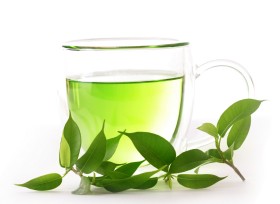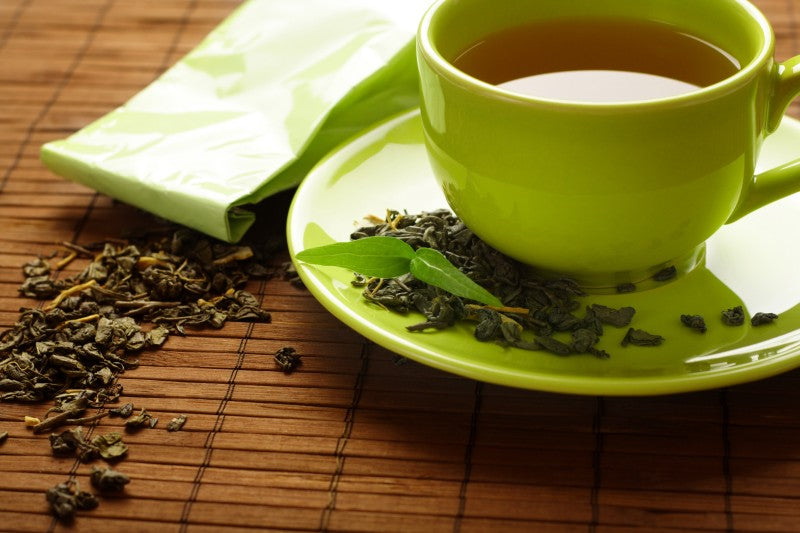Green tea is considered one of the healthiest beverage on the planet, second only to pure water. Compared to other forms of tea such as black, white and oolong, green tea is unfermented and is produced by drying and steaming the tea leaves.
[1] In its non-fermented form
green tea has significantly higher concentrations of powerful antioxidants called polyphenolic catechols.
[2]The tea polyphenols found in the highest quantities include epigallocatechin gallate (EGCG), epicatechin gallate (ECG), epicatechin (EC), and epigallocatechin (EGC).
[3] EGCG is the most popular catechins in green tea extract due to its powerful antioxidant, cardioprotective, neuroprotective, anti-inflammatory and anti-cancer properties. On average one cup of green tea provides 50mg of EGCG.
[4]Green tea extract supplements offers a more concentrated form of these polyphenol compounds and do not have the strong, aromatic, somewhat bitter taste encountered when you steep green tea leaves in water. Both green tea and green tea extract contains caffeine but the extract typically has a lower amount as a result of the processing and manufacturing process.
Green tea compounds are proven to
burn fat, prevent cancer, improve blood flow, and protect against cardiovascular issues. This article will discuss green tea extract recommended dose, use, benefits, and frequently asked questions.

MTS Tyrant is a cortisol and estrogen control agent that provides 500mg of green tea extract. Click here to order now.
Green Tea Extract Recommended Dose & Use
If you?re looking to maximize the benefits of green tea extract then focus on the EGCG content. High quality green tea extract supplements contain 40 to 50% EGCG in each capsule.
Those looking to maximize fat burn should consume 400 to 500mg of EGCG per day.
[4] This may be anywhere between 1 and 2 capsules. Those looking to utilize green tea extract?s anti-cancer properties should consume 200-300mg doses at least 3 times per day.
[4] EGCG?s half-life is between 2 and 4.5 hours so the lower dose and higher frequency will ensure green tea extract protects your body from malicious free radicals throughout the entire day.
[3]Exercise caution when using high doses at high frequencies as you may experience mild unpleasant side effects such as nausea. Check the supplement label for caffeine content; some green tea products may be decaffeinated whereas other may have around 30mg per capsule.
A Deeper Look at Green Tea Extract Benefits
Green tea extract is most well-known for its anti-cancer and fat-burning properties. 31 separate studies found that regular green tea consumption significantly decreases the risk of developing lung, breast, colon, urinary bladder, esophagus, pancreatic, and stomach cancers by decreasing or stopping cancer cell production and growth.
[5]The active anti-tumor ingredient in green tea, EGCG, acts by inducing programmed cell death (apoptosis).
[6] Apoptosis is your body?s way of housecleaning and ensuring malicious cells don't overrun the healthy cells. Women who drank more than three cups of green tea per day (equivalent to 150mg EGCG) had a 27% lower chance of breast cancer returning after treatment or remission.
[7]
These findings are incredible when one considers that breast cancer is the most common cancer types in females. Specifically EGCG interacts with estrogen receptor function, prevents estrogen-induced breast cancer cell growth, and increases the body?s sensitivity to anti-cancer drugs targeting steroid receptors.
[7] These finds suggest EGCG is effective not only in breast cancer patients but also in those looking to control and modulate estrogen levels.
Green tea extract is high in flavonoids and catechins; concentrations of these compounds are directly correlated with anti-inflammatory benefits.
[1] For those looking to optimize and prevent the decline of cardiovascular and metabolic health, consume 200-300mg of EGCG.
[8] Green tea markedly improves the clinical symptoms of rheumatoid arthritis, a debilitating autoimmune disease.
[3]Regular consumption of green tea lowers the liver enzymes alanine transaminase (ALT) and aspartate aminotransferase (AST).
[2] Exceptionally high ALT and AST blood levels suggest liver cell damage, inflammation, or injury.
[9] Diabetic rats consuming 50mg/kg or 100mg/kg of green tea polyphenols had 29% and 44% lower glucose levels, respectively, compared to the control group.
[10]While you may not be consuming such large quantities of green tea extract, these findings suggest that even moderate ingestion of these compounds can have profound effects on blood sugar levels. The active ingredients in green tea extract also lower triglyceride blood levels in healthy rats. [10] High triglyceride levels suggest excess fat in the blood and increased cardiovascular risk.
The active ingredients in green tea extract also have significant thermogenic and fat oxidizing properties. A 4-week study examining a 571mg daily dose of decaffeinated green tea extract led to a 24.9% greater total fat oxidation rate and a 1.63% greater body fat decrease compared to the placebo group.
[11]When 90mg of EGCG and 50mg of caffeine are stacked and consumed three times per day subjects had a 4% greater 24-hour energy expenditure compared to consuming caffeine-only.
[12] Green tea extract can help you lose those last few pounds of stubborn fat during a fat loss phase.
Green tea has a profoundly positive impact on bone health and fracture risk. Regular tea drinkers between the ages of 50 and 80 have a 5% higher bone mineral density and 30% lower risk of hip fractures.
[3] The active ingredients in green tea extract appears to slow or stop bone loss and injury risk. Additional findings suggest that overall bone fracture risk decreases by 10 to 20% in those that regularly consume green tea.
[3]If you?re looking for the bone strengthening benefits of green tea in a highly concentrated, convenient, and portable form then green tea extract is a must-have in your supplement regimen.

Green Tea Extract FAQs
Where can I find Green Tea Extract today?
You can find green tea extract as a stand-alone ingredient or as part of a blend in fat-burning and general health supplements. Products that contain green tea extract include:
Does Green Tea Extract have any side effects?
When used in moderate amounts in health individuals, green tea extract has no significant side effects. Humans can safely tolerate up to 1.6 grams of green tea extract in a single dose and up to 9.9 grams in a single day.
[2] Nearly 10 grams of green tea extract is equivalent to 24 cups of steeped green tea leaves.
The most common side effects of excessive decaffeinated green tea extract consumption are mild headache, dizziness, and nausea.
[2] Those using caffeinated green tea extract may also experience insomnia, anxiety, irritability, upset stomach, diarrhea, or frequent urination.
[13] As with all supplements you should start with the minimum recommended dose and adjust up or down based on your body?s response.
Is Green Tea Extract safe to stack with other supplements?
Green tea extract is extremely safe to stack with almost any other supplement. If you?re looking to increase green tea extract?s bioavailability then stack it with quercetin and fish oil.
[4] 8mg of fish oil per kg of bodyweight increases bioavailability in mice.
[14]If you?re looking to lose fat and preserve muscle mass then stack green tea extract with caffeine and ephedrine. These three compounds work synergistically to increase fat oxidation.
For tumor and cancer prevention stack this compound with curcumin, capsicum vanilloids, and inositol.
[4] While combining these compounds won't eliminate cancer, it may slow down tumor and cancer cell growth, particularly in the colon.
And lastly, to maximize the anti-oxidant, antimicrobial, and neuroprotective benefits of green tea extract, stack it with vitamin C, L-Theanine, CoQ9, and butylated hydroxyanisole.
[4] When you begin stacking compounds it's important to start with conservative doses and adjust based on your body?s response.
Green tea extract is not recommended for those with heart conditions and major cardiovascular problems.
[10] If you?re on prescription medications then you should check with your doctor before using green tea extract. Avoid taking green tea extract with dietary carbohydrates, dietary iron, salicyclic acid, and ferulic acid as the absorption and bioavailability of EGCG is reduced.
[4]Green tea extract consumption in reasonable doses is an excellent health and fat-loss promoting supplement in healthy individuals.
References
1) Chatterjee, Priyanka et al. ?Evaluation of Anti-Inflammatory Effects of Green Tea and Black Tea: A Comparative in Vitro Study.? Journal of Advanced Pharmaceutical Technology & Research 3.2 (2012): 136?138. PMC. Web.
2) "DRUG RECORD - GREEN TEA (CAMELLIA SINESIS)." LiverTox. United States Library of Medicine, 17 Mar. 2014. Web.
3) Shen, Chwan-Li et al. ?Green Tea and Bone Metabolism.? Nutrition research (New York, N.Y.) 29.7 (2009): 437?456. PMC. Web.
4) Frank, Kurtis, et al. "Green Tea Catechins." Examine.com. N.p., 2016. Web.
5) Janle, Elsa M. et al. ?Pharmacokinetics of Green Tea Catechins in Extract and Sustained-Release Preparations.? Journal of dietary supplements 5.3 (2008): 248?263. PMC. Web.
6) SUZUKI, Yasuo, Noriyuki MIYOSHI, and Mamoru ISEMURA. ?Health-Promoting Effects of Green Tea.? Ed. Takao SEKIYA. Proceedings of the Japan Academy. Series B, Physical and Biological Sciences 88.3 (2012): 88?101. PMC. Web.
7) Li, Min-Jing et al. ?Green Tea Compounds in Breast Cancer Prevention and Treatment.? World Journal of Clinical Oncology 5.3 (2014): 520?528. PMC. Web.
8) Wolfram, S. "Effects of Green Tea and EGCG on Cardiovascular and Metabolic Health." National Center for Biotechnology Information. J Am Coll Nutr., Aug. 2007. Web.
9) Mayo Clinic Staff. "Elevated Liver Enzymes." Mayo Clinic. N.p., 5 May 2015. Web.
10) Chacko, Sabu M et al. ?Beneficial Effects of Green Tea: A Literature Review.? Chinese Medicine 5 (2010): 13. PMC. Web. 26 Jan. 2016.
11) Roberts, J. D., et al. "The Effect of a Decaffeinated Green Tea Extract Formula on Fat Oxidation, Body Composition and Exercise Performance." National Center for Biotechnology Information. J Int Soc Sports Nutr., 21 Jan. 2015. Web.
12) Dulloo, A. G. "Efficacy of a Green Tea Extract Rich in Catechin Polyphenols and Caffeine in Increasing 24-h Energy Expenditure and Fat Oxidation in Humans." National Center for Biotechnology Information. Am J Clin Nutr., Dec. 1999. Web.
13) "Green Tea." National Center for Complementary and Integrative Health. National Institutes of Health, Apr. 2012. Web.
14) Giunta, B., et al. "Fish Oil Enhances Anti-amyloidogenic Properties of Green Tea EGCG in Tg2576 Mice." National Center for Biotechnology Information. Neurosci Lett., 8 Mar. 2010. Web.


 These findings are incredible when one considers that breast cancer is the most common cancer types in females. Specifically EGCG interacts with estrogen receptor function, prevents estrogen-induced breast cancer cell growth, and increases the body?s sensitivity to anti-cancer drugs targeting steroid receptors. [7] These finds suggest EGCG is effective not only in breast cancer patients but also in those looking to control and modulate estrogen levels.
These findings are incredible when one considers that breast cancer is the most common cancer types in females. Specifically EGCG interacts with estrogen receptor function, prevents estrogen-induced breast cancer cell growth, and increases the body?s sensitivity to anti-cancer drugs targeting steroid receptors. [7] These finds suggest EGCG is effective not only in breast cancer patients but also in those looking to control and modulate estrogen levels.